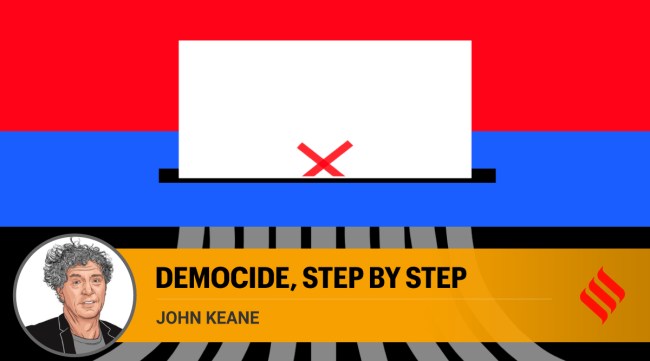Opinion John Keane writes: Friends of democracy need to look beyond insurrection on Capitol Hill or riots in Brazil
In these times of rising anxiety about the future of democracy, pay attention to the way democide can happen at tortoise pace -- through the slow-motion, unspectacular convergence of social deprivation and environmental decay
 These are difficult and urgent questions for democracies facing insurrections, but it turns out that those who sensationalise them are doing us a disservice. (Illustration: C R Sasikumar)
These are difficult and urgent questions for democracies facing insurrections, but it turns out that those who sensationalise them are doing us a disservice. (Illustration: C R Sasikumar) The writing is on democracy’s wall. Things are serious. Some observers say that an anti-democratic counterrevolution on a global scale is now underway. Recalling the disasters of the 1920s and 1930s, when most new democracies perished, they draw attention to the evidence supplied by breaking news stories. Foul wars in Africa and Europe. Inflation. Broken party systems. Lying, scheming politicians. Middle class anxiety. Angry underclasses sure that democracy is a mere façade for plutocracy. Populism. Demagogues. Resurgent bigotry. Religious intolerance. Media untruths. And now, as if things are coming to a head, a string of violent insurrections against elected governments.
These insurrections against democracy are definitely worrying. They are as spooky as they were unexpected. Nobody anticipated that Washington would witness a well-organised mob assault on the Capitol by thousands of protesters hellbent on overturning an election result, cheered on from the top by a defeated president and his buddies. Or that in Frankfurt, in a police dawn raid, a prince, allegedly backed by a 20,000-strong network of far-right extremists known as Reichsbürger, among them a celebrity chef, a judge, doctors, an arms dealer, and ex-police officers and soldiers, would be arrested on suspicions of leading a plot to storm parliament and violently overthrow the elected government to establish a new German Kaiserreich. And few predicted that in Brasilia thousands of pro-Bolsonaro citizens would invade and occupy the Three Powers Square — or that these angry citizens, calling for military intervention, would with the help of local police storm the presidential palace, where they destroyed works of art and hurled broken furniture through shattered windows; ransacked ceremonial rooms in the Supreme Court; stole computer equipment containing sensitive information; and activated sprinkler systems to flood parts of the Congress building.
Journalists with a taste for headline drama pounce on these events. Hyping things up by likening them to Hitler’s botched Beer Hall putsch (in early November 1923), they say democracy is “backsliding” towards cliff’s edge. Their conviction that democide happens in the blink of an eye, in puffs of smoke, rat-a-tat gunfire and surging mobs, should be noted. So must their silence about the positive countertrends of our age — democratically well-governed cities and resilient judiciaries, for instance, or women’s unflagging struggles for dignity and success stories such as India, where democracy took root because it was the best way of guaranteeing dignity to many millions of poor citizens in a post-colonial society of multiple faiths and languages.
It’s true that the sudden-death interpretation of the latest insurrections has merits. It reminds us of the great fragility of democracy, above all the way building a democracy, which can take at least a lifetime, or longer, is a much tougher task than its destruction, which can be done in a trice. The interpretation also forces onto the political agenda tricky tactical questions about how best to prevent insurrections without ruining the spirit and substance of democracy. Can harsh crackdowns on insurrectionists and their allies actively win majority support among grassroots citizens networks? Is the arrest, conviction and imprisonment of conspirators compatible with media freedom and respect for the rule of law? Can the army be persuaded democratically to stay loyal and remain in its barracks, and not to train its pepper spray guns, tanks and helicopters on innocent citizens?
These are difficult and urgent questions for democracies facing insurrections, but it turns out that those who sensationalise them are doing us a disservice. Insurrections aren’t democracy’s gravest threat. The troubling truth is that it can be destroyed in multiple ways, in different tempos. There’s no single Iron Law of Democide. Democracy can perish more gradually, for instance at the hands of high-level political plots and knife-edged, behind-the-scenes manoeuvrings. The military coup d’états against the elected governments of Egypt, Myanmar, Chad, Mali, Guinea and Sudan during the past decade are examples.
Then there’s the populist road to democide, whose “rhythm” is slower still (‘Democratic route to despotism’, IE, December 9, 2021). High-level political games of thrones and populist demagoguery take years to win out, to prove that ballots can be used to ruin democracy just as effectively as bullets. The cases of Hungary and Serbia suggest that around a decade is required for populist governments to have ruinous effects on free and fair elections, parliaments, independent courts, watchdog media and other institutions of monitory democracy. Left unopposed, the outcome is deeply anti-democratic: A distinctively 21st-century type of corrupted “mafia state” (as Hungarians say) led by a demagogue and dominated by wealthy state and corporate “poligarchs”, a top-down phantom democracy built with the collaboration of pliant journalists, docile judges and the votes of millions of loyal subjects.
Democracies can perish in still other ways, and even more gradually. The weakness of sudden-death, military coup and populist explanations of democide is their neglect of the civil society and environmental foundations on which any given democracy rests. In these times of rising anxiety about the future of democracy, its friends should pay attention to the way that democide can happen at tortoise pace — through the slow-motion, unspectacular convergence of social deprivation and environmental decay. Remember: Democracy is much more than pressing a button or ticking a box on a ballot paper. It goes beyond the mathematical certitude of election results, majority rule and lists of minority rights. It’s not reducible to lawful rule through independent courts or attending local public meetings and watching breaking news stories scrawled across a screen. Inspired by the spirit of equality and refusals of predatory power, democracy is a whole way life whose delicate geo-social foundations are ignored or neglected at its peril.
The media fixation on the past year’s drama-ridden insurrections is understandable. But it risks tricking us into forgetting that democracy dies a slow-motion death not only when citizens suffer such indignities as domestic violence, poor healthcare, religious and racial bigotry, and daily shortages of food and housing. Democracies also destroy themselves step-by-step, slowly but surely, when they foul their earthly nests. The slowest form of democide is the most lethal. It happens when citizens and their chosen representatives become victims of what the writer Amitav Ghosh calls a “great derangement”: The blindness that comes when they give themselves over to a homocentric delusion, a type of all-too-human thoughtlessness that stops them from seeing that extreme weather events, pestilences and other environmental catastrophes not only breed power grabs and get people used to emergency rule, but that democracy won’t have an earthly future unless its ideals and practices are rid of the old democratic prejudice that “the people” are rightful “sovereign” masters of a “nature” treated as technologically controllable and as a commercially exploitable resource for their use and enjoyment.
Keane is Professor of Politics at the University of Sydney. His most recent book, just published in India, is The Shortest History of Democracy.


